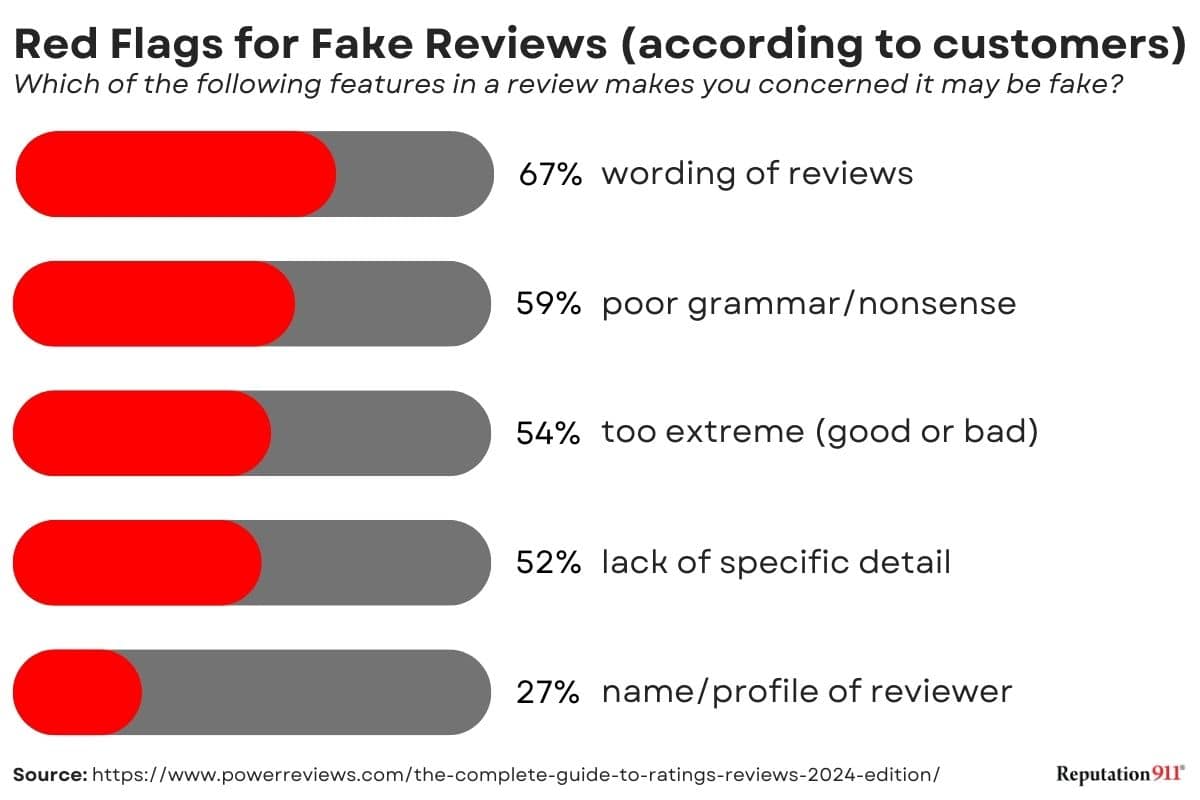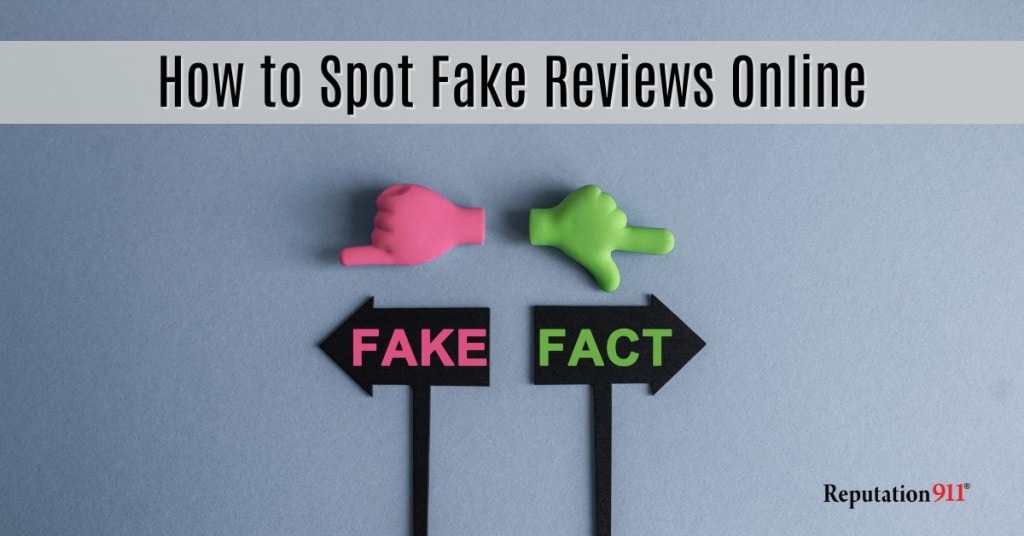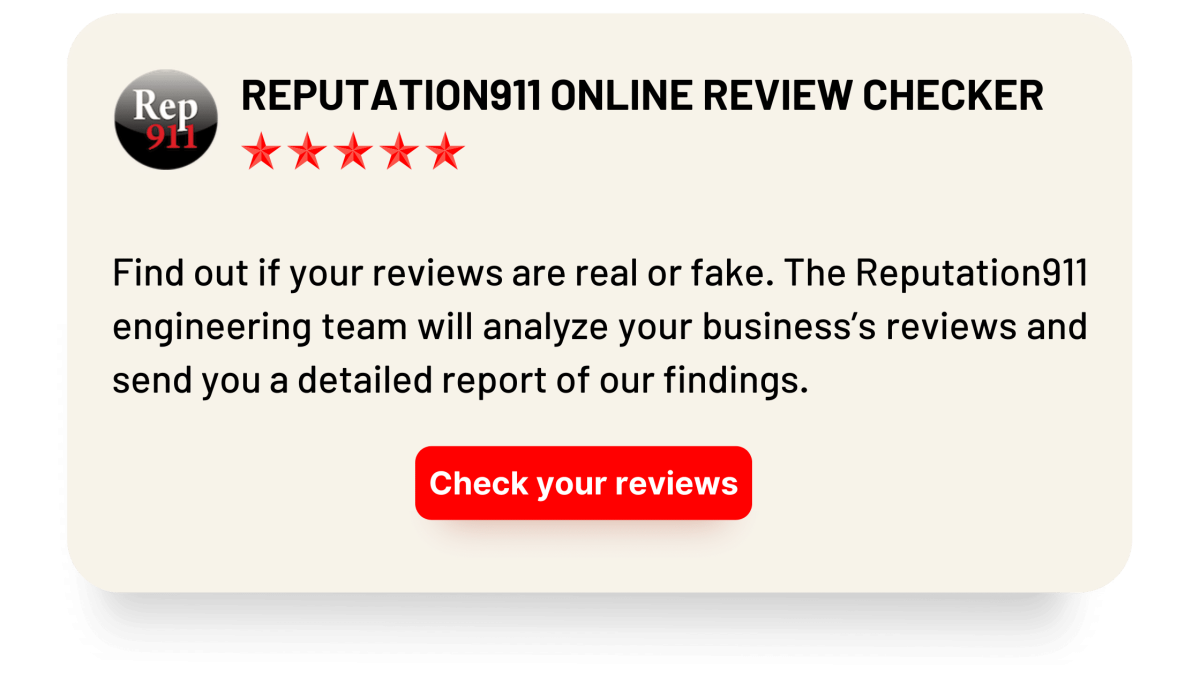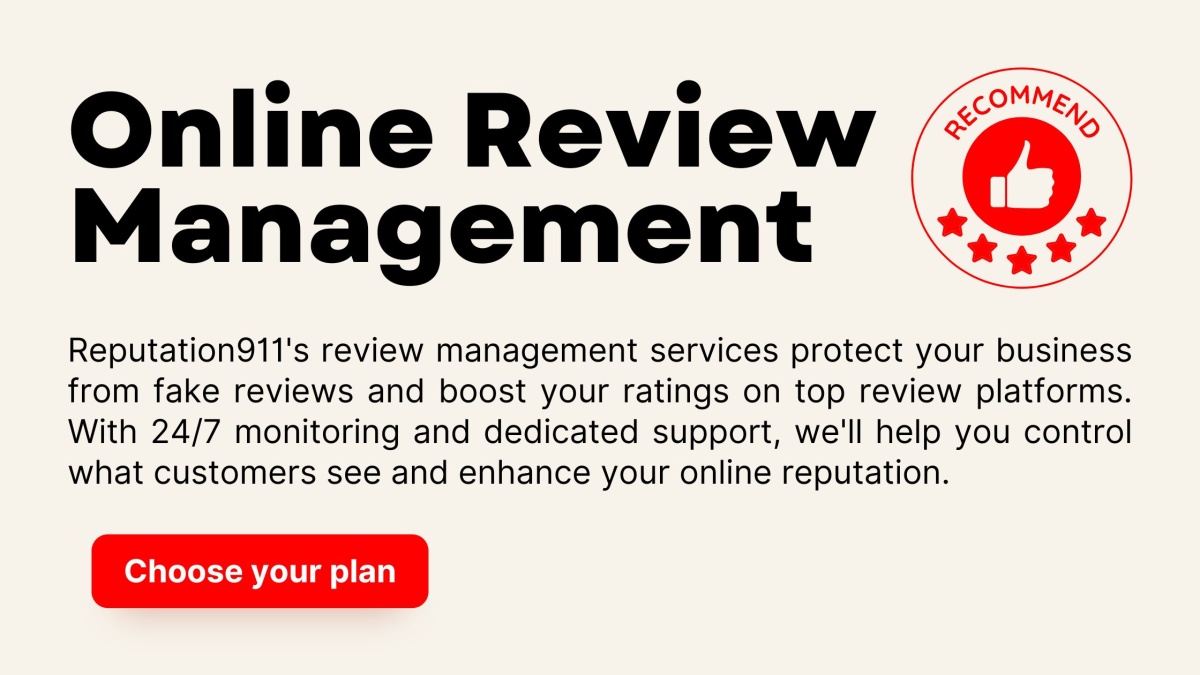These days, most people shop or search for businesses online, meaning online reviews can make or break your business. But, what if that glowing 5-star rating or scathing 1-star review isn’t as it seems? Today, we’ll teach you how to spot fake reviews.
Fake Online Review Statistics:
You can’t understate the importance of reviews for businesses. This makes fake ones a huge concern for both customers and businesses alike.
Here are some key statistics about the impact of misleading reviews:
- Prevalence on Major Platforms: 10.7% of Google reviews are inauthentic, along with 7.1% on Yelp, 5.2% on TripAdvisor, and 4.9% on Facebook. (AgilityPR, Uberall-Transparency Company 2021)
- Public Concern: 79% of people believe fake reviews are a problem. Meanwhile, 43% of customer feedback for best-selling Amazon products is not genuine. (CouponBirds Survey 2024)
- Impact on Consumer Decisions: 93% of consumers say online reviews impact their purchase decisions. But, 82% of customers have read a fake review in the last year, with younger people tending to read more of them. (Invespcro)
- Too Good To Be True: 95% of consumers are skeptical of products or services with 5 star reviews. 30% of consumers assume feedback is fake if it is too positive. (Invespcro)
- Believe It or Not: 74% of reviewers can’t tell if a review is genuine or fake. (Wisernotify)
- Financial Impact: Fake reviews cost businesses $152 billion annually from damaged reputations (Wisernotify, Starfish Reviews)
- Customer Suspicion: If a customer suspects a fake review, 56% won’t buy the product again. 25% of people won’t buy from the website at all. (Wisernotify, BazaarVoice)
- Loss of Consumer Trust: Once a consumer loses trust in a brand, 81% avoid buying from the brand again. 48% will leave a negative review, and 16% will post about the brand on social media (Wisernotify, Bazaarvoice)
- Regulatory Action: The FTC cited more than 700 businesses for deceptive endorsements in 2021.
Who Leaves Fake Reviews?
To understand where fake reviews actually come from, we’ll break this down into 2 categories:
“Good” Fake
Some businesses themselves actually elicit false feedback to artificially boost their star ratings on review platforms. The FTC refers to these as “own-dorsements“. Companies do this a few different ways:
- Hiring paid reviewers, using review farms, or using review bots/software to post false feedback.
- Incentivizing customers to leave positive feedback. The company will offer them discounts, free products, gift cards, etc in exchange for a good customer review. They may also host contests or giveaways.
- Asking friends, family, or employees to leave feedback under the guise of a customer.
Note: Soliciting fake positive feedback can have serious consequences for your business and reputation.
“Bad” Fake
Of course, there are also a lot of false negative reviews. They come from a few different sources:
- Disgruntled customers trying to “get back” at the business. This is way beyond just giving an accurate review of poor services, but rather a revenge tactic. This can often happen on employer review sites like Glassdoor.
- Ex-employees who are upset with their former employer post fake reviews disguised as a customer.
- Trolls, who leave negative comments just to cause trouble.
- Businesses trying to take down the competition. They may hire writers or use bots or review farms to write negative comments on their competitor’s review pages.
Are Fake Reviews Illegal?
Yes, writing fake reviews is often illegal, falling under consumer protection laws, advertising regulations, and anti-fraud legislation.
Here are some specific laws:
- Federal Trade Commission Act (FTCA) Section 5 prohibits “unfair or deceptive acts or practices in or affecting commerce.” FTC guidelines require endorsements to be truthful and not misleading. Endorsers must disclose any connections to the business.
- Lanham Act Section 43(a) allows businesses to sue competitors for false advertising to mislead customers.
- Consumer Review Fairness Act (CRFA) makes it illegal for companies to include “gag clauses” in contracts preventing customers from giving honest feedback.
- Many states have Unfair and Deceptive Acts and Practices (UDAP) Laws that prohibit unfair and deceptive business practices. Examples include California’s Unfair Competition Law (UCL) and New York’s General Business Law Section 349.
- The Trade Regulation Rule on the Use of Consumer Reviews and Testimonials: The FTC published a proposed rule in 2023 “which would prohibit certain specified unfair or deceptive acts or practices involving consumer reviews or testimonials.”
Many platforms also have specific policies about false reviews, including Amazon, Google, Yelp, TripAdvisor, Facebook, and more.
Yet despite these rules, this issue is rampant.
According to Kay Dean, former federal criminal investigator and founder of Fake Review Watch:
“The online review world is the wild west, and there is no sheriff.”
6 Tips to Spot Fake Reviews
With a growing concern about fake reviews, business owners and consumers must stay vigilant.
Watch out for these red flags:
1: Watch out for weird or suspicious wording
Be wary of comments that sound unnatural, generic, or overly promotional. Real feedback tends to have a more spontaneous and genuine tone. But, fake ones may sound too formal or repetitive.
Companies that hire paid reviewers know how to use Search Engine Optimization to get reviews to rank. Watch out for wording that sounds more like an ad rather than someone’s opinion.
2: Do a grammar check
Fake reviews tend to have grammatical errors, awkward phrasing, or just sound like nonsense. This means someone either wrote it in a hurry or translated it.
Obviously, not everyone has perfect grammar. But, most people don’t have atrocious grammar, so watch out.
Some comments could also sound overly polished to the point of reading as robotic.
3: Pay attention to extreme opinions
People who leave genuine reviews typically try to offer a fair perspective. Real reviewers write about pros and cons, good and bad, that kind of thing.
But, when you see an overly positive or negative review, then it’s likely misleading. Be skeptical of any review that gives extreme praise or criticism without any reasons to back it up.

4: Look for specific details
Genuine feedback usually mentions specific things the reviewer likes or dislikes. They could include particular features, personal experiences, or even comparison to other products.
But, fake reviews are often generic, and might sound like they could be about anything. This indicates that the reviewer has no actual experience with the product or service. (It could also mean a customer hastily wrote a review to get a freebie.)
So, be skeptical of any comments that sound too vague, like “Great product!” or “Horrible!”.
5: Check the reviewer’s profile
If you are truly on the fence about whether or not the review is fake, check the reviewer’s profile. Ask yourself these questions:
- Does the reviewer’s profile lack pictures, social media links, posts, etc?
- Do they offer thoughtful feedback or not?
- Do they have a diverse review history with consistent activity over time?
- Do they only have one posted review?
- Do they only give feedback to a single business?
6: Keep an eye on the timing
As a business owner, check the timing of reviews. If you suddenly receive a lot of negative feedback, this could signal a coordinated attack.
Real feedback typically comes in over time as people buy and use the product. If they appear in clusters, and share similar wording or themes, be suspicious.
Fake Online Reviews: What To Do Next
Spotting fake reviews is great, but what can you actually do about them? Here are our tips:
- Monitor review sites regularly to keep an eye out for anything suspicious.
- If you suspect disingenuous feedback is damaging your business, check out our review removal guide.
- Update your Google Business profile or any profiles on other platforms to give your business a fresh, professional presence.
- Respond to feedback, whether good or bad. Customers read your responses, so this at least lets people know that you care what others think of your business.
- Encourage authentic feedback from your customers. Ask each customer to leave a review, either in-person or by sending a follow-up email.
Every business needs an online review strategy to establish trust and loyalty with their customers. If fake or negative reviews are damaging your business, Reputation911 is here to help. Our reputation management company offer plans to monitor feedback, increase your star ratings, promote positive feedback, and suppress the bad. Get in touch for a free consultation today.





